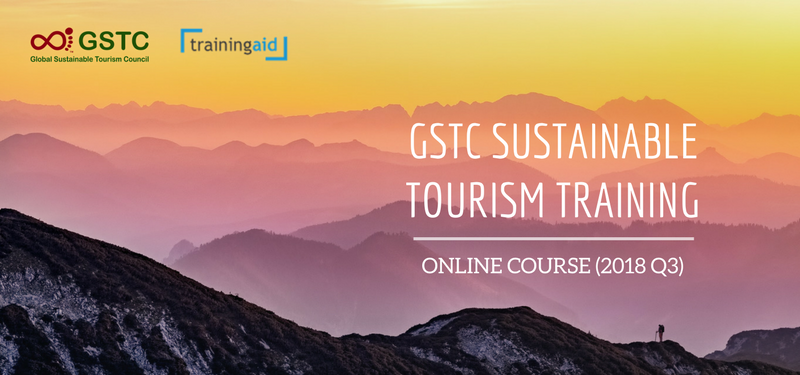What: 4-week sustainable tourism online course by the GSTC
When: July 2-27, 2018*
Where: Online
Language: English
| SOLD OUT This course is now sold out. If you would like to be added to the wait list, please contact training@gstcouncil.org (Subject: “GSTC online course 2018Q3”). The next course (2018Q4) is scheduled for Oct 15 – Nov 9, and is available for registration. |
*Weekly live webinars scheduled for 14:00-15:00 CEST (show on your time zone) on the following days:
- Week 1: Monday, July 2nd and Thursday July 5th
- Week 2: Monday, July 9th and Thursday, July 12th
- Week 3: Monday, July 16th and Thursday, July 19th
- Week 4: Monday, July 23rd and Thursday, July 26th
These live webinars will be recorded and participants will be able to watch the recordings any time during the training class period. Although strongly encouraged, attending these sessions live is not mandatory.
About the Course | Exam & Certificate | Course Topics & Objectives | Course Modules | Trainer & Presenters | Registration Details | Discount Options
Sustainable Tourism Online Course for Industry Professionals
The GSTC Sustainable Tourism Training Program (STTP) provides the knowledge and resources needed to help improve sustainability practices by tourism industry businesses and destinations. Built on the framework of the GSTC Criteria, the global baseline standards for sustainability in travel and tourism, the STTP training class will help you achieve tangible actions that fulfill the globally recognized standard of sustainability best practices.
Delivered as a 4-week-long facilitated and interactive training class, the sustainable tourism online course offers a convenient way to improve your sustainability skills in a flexible online learning environment, while at the same time learning alongside GSTC experts and fellow sustainable tourism practitioners.
 Certificate in Sustainable Tourism
Certificate in Sustainable Tourism
By completing this 4-week online training class of the STTP, you will meet the training requirement towards earning the GSTC Certificate in Sustainable Tourism.
Once you complete the class, you will have have access to the official STTP Exam, and upon successful completion (75% and above passing mark is required), receive a Certificate in Sustainable Tourism by the GSTC to demonstrate your knowledge of sustainable tourism standards and practices.
>> Learn more about GSTC Certificate in Sustainable Tourism
Course Topics and Objectives
The GSTC Sustainable Tourism Training covers both global and regional perspectives, and offers practical guidance through best practice cases and real-life lessons to help you achieve tangible sustainability performance goals. The training curriculum includes global trends and issues in sustainable tourism, sustainability best practices by businesses and destinations, and lessons on utilizing the GSTC Criteria as a tourism development and management tool.
You will:
- Gain an in-depth understanding of sustainable tourism standards and the roles of accreditation and certification bodies in the global tourism industry.
- Be able to make informed decisions on how to implement sustainability practices for your company or destination, utilizing quality sustainable tourism standards as guiding principles.
- Learn how to build and implement viable and actionable sustainable tourism plans for your organization, including effective strategies for sustainability management, partnerships, engagement and marketing.
Course Modules
| Module | Topics & Learning Goals | Live Events |
| Week 1: Effective Sustainable Tourism Management | The first module provides an introduction to the GSTC Criteria, the definition and principles of sustainable tourism, and the GSTC’s roles in the global tourism industry, and discusses best practices in sustainable tourism management approaches (GSTC Criteria Section A). Learning Goals:
| Monday, July 2nd: Orientation Meeting
Thursday, July 5th: Sustainability Management, Planning and Marketing Quality Experiences
|
| Week 2: Socioeconomic Impacts and Local Community Benefits | The goal of the second week is both to dive deeper into the GSTC Criteria and to discuss practical steps to applying the Criteria in the real-world context, focused on understanding the socioeconomic impacts of tourism activities, and on effective strategies for reducing negative impacts (GSTC Criteria Section B). Learning Goals:
| Monday, July 9th: Social, Economic and Cultural Impacts: Maximizing Community Benefits
Thursday, July 12th: Group Presentation Part 1
|
| Week 3: Cultural Heritage Preservation and Promotion | Continuing on with lessons and expert presentations on the GSTC Criteria, this week focuses on how tourism businesses and destinations can minimize negative impacts, maximize benefits to local communities and protect cultural heritage through sustainable tourism (GSTC Criteria Section C). Learning Goals:
| Monday, July 16th: Protecting Cultural Heritage, Promoting Sense of Place
Thursday, July 19th: Engaging and Education Visitors in Sustainability Practices
|
| Week 4: Resource Management and Environmental Conservation | In the fourth and last module of the course, key strategies for reducing tourism’s environmental footprint are presented, and practical action steps in implementing sustainable resource management and conservation practices are discussed (GSTC Criteria Section D). Learning Goals:
| Monday, July 23rd: Achieving a Sustainable Balance: People, Planet and Profit
Thursday, July 26th: Final Presentations
|
GSTC Trainer: Steve Noakes
Steve Noakes has been involved in the travel and tourism industry for 40 years, and is a long term advocate for sustainable tourism practices across the Asia Pacific region. He is founder of Pacific Asia Tourism, an international project management company focused on tourism’s capacity to contribute to the Sustainable Development Goals and the Global Code of Ethics for Tourism. He is also Director/part-owner of Ecolodges Indonesia & EcoSafari Indonesia, operating ecolodges and inbound tours with a wildlife and biodiversity conservation focus across Indonesia, a Director of Binna Burra Mountain Lodge in the world heritage listed Lamington National Park in Australia and a Director of the Lamington Natural History Association at Lamington National Park.
In 2008, Steve was honoured with the inaugural Ecotourism Australia Medal, recognizing his active engagement in the Australian and international ecotourism industry. He was the lead Asia Pacific representative in the development of the Global Sustainable Tourism Council, serving on the GSTC Board, the Education & Training Working Group, the Election Committee, the GSCT Trainers Selection Committee and as a senior GSTC Trainer. He has also been an active participant on the UNWTO Panel of Tourism Experts and the World Committee on Tourism Ethics, contributing to a number of UNWTO projects in Asia and East Africa. He the past two decades, has served as an Adjunct/Visiting Professor in Sustainable Tourism, at Universities in Australia, Norway and Finland. Nowadays, he is an Adjunct Research Fellow at the Griffith Institute for Tourism, Griffith University, Australia, and teaches the full semester Sustainable Tourism & Indigenous Cultures, subject at Bond University, Gold Coast, Australia.
Keith Sproule, Executive Director, Abercrombie & Kent Philanthropy

Through June, 2014, Keith was the Tourism Business Advisor for the World Wildlife Fund in Namibia for five years, where he supported initiatives to develop both private sector and community tourism capacity across some of the most rural, isolated regions of Sub-Saharan Africa. Keith has more than 25 years of experience in the public and private sectors focused on tourism planning and development. He has worked in Asia, Africa, Central Europe, the Middle East and the Americas. As an analyst and tourism development specialist, he has focused in particular on the economics of cultural heritage and nature-based tourism, most often in association with rural communities.
His professional background includes serving as an advisor to governments on three continents and operations consulting with hotel and tourism companies globally. Keith has a Bachelor of Science degree from the College of Agriculture at the University of Vermont, and has completed a masters’ degree in international economics at Johns Hopkins University School for Advanced International Studies (SAIS). He was a Fulbright Scholar in Belize, studying the expenditure patterns of visitors to archaeological sites.
Randy Durband, GSTC CEO

He brings his knowledge of the business of travel, his global network of travel professionals, and a passion for sustainability to support the GSTC and the general sustainable tourism movement. He has held several board positions and committee memberships in travel and tourism organizations, and is a frequent speaker on sustainable tourism issues.
Registration Details
The early-bird registration fees (available through May 25th, 2018) for this class are:
- US$ 445 per person (Regular)
- US$ 395 per person (GSTC Member)
After May 25th, 2018:
- US$ 495 per person (Regular)
- US$ 445 per person (GSTC Member)
*For GSTC Organization members, the above member discount is available to all staff members and can be used for an unlimited number of times.
What’s Included
As part of your registration, you will receive training materials to be provided prior to the class; access to the online training platform; and a Certificate of Completion confirming your attendance in the class.
Please note: the STTP Exam fee (US$ 75 per person) is NOT included in the above course registration fee. If you would like to take the exam after the course, you can select the add-on option “Exam & Certificate” when you register, or you can also sign up for the exam afterwards.
Discount Options
Group Discounts
You can sign up multiple people at the same time when registering online. Select the number of people you would like register, and you can enter contact details for each participant on the form.
We also offer a discount for each group purchase of more than 5 seats.
- 5-10 people: US$ 375 per person.
- 11+ people: US$345 per person
If you would like to sign up as a group of 5 and more, please contact us (training@gstcouncil.org) for more details.
Need-Based Discounts
We offer a limited number of need-based discounts to current students and professionals who demonstrate genuine needs. To apply, please submit this application form.
| SOLD OUT This course is now sold out. If you would like to be added to the wait list, please contact training@gstcouncil.org (Subject: “GSTC online course 2018Q3”). The next course (2018Q4) is scheduled for Oct 15 – Nov 9, and is available for registration. |
*Can’t make it to this class? STTP online training classes are offered quarterly, in addition to the onsite face-to-face training classes offered throughout the year in various locations around the world. See all upcoming STTP training classes here.



 Certificate in Sustainable Tourism
Certificate in Sustainable Tourism


